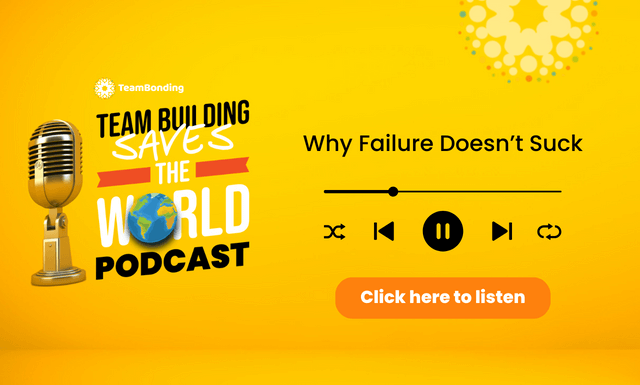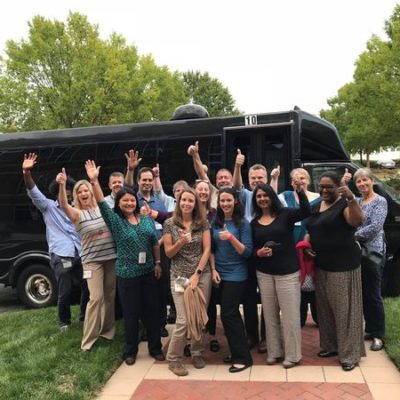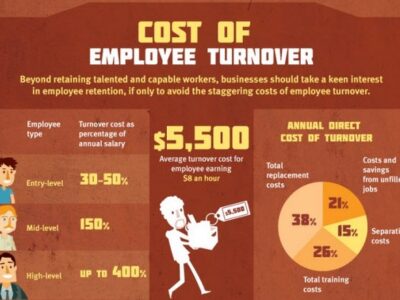The fear of judgment and failure is present in many aspects of our lives, particularly in the workplace. These two common fears can arise for a variety of reasons. It’s human to want to be accepted, excel at our jobs, and support ourselves and our loved ones. But these very natural desires can inadvertently fuel social anxiety at work, leading to a powerful fear of judgement or failure.
In a past episode of the Team Building Saves the World podcast, company culture expert Chris Dyer shared a powerful insight about failure and why we should embrace it:
“If you’re going to go into this game thinking you’re never going to make a mistake, you’re going to get upset when you do and will never get anywhere.”
This blog will go beyond simply acknowledging these fears. We’ll take a deeper look at the fear of being judged at work, the fear of failure, and how embracing failure can help us break free and advance our careers.
What is the Fear of Judgment in the Workplace?
Did you know that 56% of employees say anxiety often impacts their workplace performance? Or that 97% of people between 25 and 34 fear colleagues will judge their communication?
Those are some staggering statistics, so let’s look at the fear of being judged. Fear of judgment is surprisingly common at work, and it’s something nearly everyone experiences at some point. It can manifest in numerous ways in the workplace, so let’s consider some examples.
How Does Fear of Judgement and Failure Hold Us Back?
Let’s say you have a big project coming up at work. Your boss has assigned you this task, and it’s incredibly important. You know you can get it done right, but you worry that it won’t be good enough and you’ll be judged negatively. That can make you feel paralyzed, as though it won’t work out no matter what you do.
That is a common way for a fear of judgment or failure to rear its head. People want their coworkers to have positive opinions of them, and they get worried they’ll be judged if they make mistakes. To some degree, this is a reasonable fear. However, we all make mistakes, and we can’t let the fear of a potential mistake stop us from trying.
Where Does Social Anxiety at Work Emerge?
Another common way this fear of failure at work can manifest is anxiety surrounding creativity and innovation. Being able to share your ideas, good or bad, is an essential part of having a culture of innovation. But many fear that their ideas will be ridiculed. This fear often arises in more toxic work environments where open and effective communication isn’t encouraged.
All that said, fearing judgment is a natural human tendency. It’s not something you should be ashamed of feeling. But it can have negative consequences if left unaddressed. If you want to achieve your fullest potential, you must overcome those fears.
Though fear is not necessarily bad, the fear of failure at work is more than just a momentary concern—it’s a psychological barrier that can hold you back from achieving your full potential. When you’re struggling to overcome this fear, you might get trapped in a cycle of hesitation, causing you to avoid taking risks and miss chances to achieve your dreams.
3 Signs You’re Experiencing Fear of Judgment
Social anxiety and work don’t always play nicely together. But how do you know if you’re experiencing a fear of judgement that’s holding your career back? Here are three key signs that your fear of being judged is something that needs to be addressed.
1. Overthinking and Second-Guessing
When you fear judgement, you might find yourself constantly second-guessing your decisions and overthinking communication or experiences in the workplace. Maybe you spend hours drafting and redrafting emails or rehearsing potential responses for meetings.
This ongoing mental paralysis can prevent you from showcasing your true potential, which in turn can hinder your professional growth.
2. Avoidant Behavior
A fear of judgment can manifest as avoidant behavior, causing you to shy away from opportunities and challenges that could benefit your career. Your first instinct might be to shrink into a corner when difficult projects are announced or to decline leadership roles when they’re presented.
Overcoming the fear of failure can help you stem this self-sabotaging behavior so you can focus on professional development.
3. Stress Responses
When you experience signs of stress, it’s often a signal that your body and mind are suffering from a fear or anxiety in your life. According to the Cleveland Clinic, stress responses might include:
- Headaches, dizziness, or shaking
- Chest pain and a racing heart
- Trouble sleeping
- Muscle and jaw tension
- Anxiety
- Sadness and depression
- Panic attacks
What Are the Negative Consequences of the Fear of Judgement?
If you fear judgment, you aren’t alone. It’s a common thing to experience, but it can have serious negative consequences when allowed to control your life. Let’s look at two of the most common consequences.
Missed Opportunities
Missed opportunities are one of the most common and impactful negative consequences of fearing judgment. How it happens is pretty simple—you fear being judged, so you end up passing on potential opportunities.
For example, your boss offers you a big new project that could help you get promoted if you do well. However, you worry that you won’t do a good enough job and will be judged harshly for your performance. Because of that, you decline, and the project goes to someone else. You miss that opportunity solely due to your fear of being judged.
Stifled Creativity
Another significant consequence is stifled creativity in the workplace. As mentioned earlier, failure is a key part of the creative process. For every great invention and innovation, there’s a trash can full of scrapped ideas beside the proverbial desk. If you fear being judged for your potential failures, you’ll never reach your creative potential.
This has adverse effects on the company as a whole, too. If you and your teams aren’t willing to take risks and be creative in the name of growth, your company will stagnate alongside them. Success demands teams that constantly improve, innovate, and move forward, and that doesn’t happen when people fear being judged.
How Can We Embrace Failure?
So, how can we overcome our natural fear of judgment? One of the best ways is to embrace failure. It may sound backward, but embracing failure can help you move beyond your fears and reach your full potential.
Failure is an inevitable part of growth and success. Every new invention, great success, or incredible accomplishment came after weeks, months, or even years of struggle and failure.
Writer Robert Pirsig was famously rejected by 121 publishing companies before his landmark novel Zen and the Art of Motorcycle Maintenance was published. Yet he persevered, and eventually, his book became a widely praised classic.
The most successful companies understand this too. They know they need to fail before they can succeed, and they embrace those failures. Dyer mentioned this in our podcast, highlighting how 3M embracing their failures and learning from them has led to success.
“Most great companies recognize that mistakes and this idea of intentional failure is a part of their DNA and is a part of what they do. 3M is a great example of this… They’re a company who invents, and so they have inventions and experiments. It’s naturally a part of their process to try something and fail. But they document things… So people could learn. So people didn’t have to repeat those [failures].”
Though it can be difficult at first, embracing failure is a necessity if you want to overcome the fear of being judged at work.
What Are the Benefits of Embracing Failure?
Before moving on to some strategies for overcoming the fear of judgment, let’s dive deeper into the benefits of embracing failure. Here are some key ways that learning how to overcome a fear of failure can improve your life.
Personal Growth and Resilience
One of the top benefits is that overcoming your fear of failure can help with personal growth and resilience. For example, did you know that both theoretical and empirical evidence show that humans learn best when we fail 30% of the time?
If you embrace failure as an inevitable part of growth, you can learn from your mistakes and failures, using them to help you overcome the challenges before you. Through failure, you can learn and develop resilience that will help you grow personally and professionally.
Culture of Innovation
Another benefit is how it can create a culture of innovation. As Dyer illustrated with his 3M story above, failure is an inevitable part of innovation. If you can create a workplace that embraces failure, people will be more apt to take risks and get creative without worrying about the outcome. This leads to innovation, which ultimately helps your company succeed.
Increased Collaboration
Lastly, embracing failure can lead to increased collaboration and teamwork. If your company embraces failure, your team members will be more likely to learn from each other’s mistakes, build upon each other’s ideas, and work together on new things.
Team building programs can help your teams learn to embrace failure. Focusing on employee wellbeing and showing them that failure should be embraced can have a big impact. Team building exercises can also increase communication and collaboration, which will also help with being able to embrace failure.
How to Overcome Fear of Failure and Being Judged
To wrap up, let’s look at some strategies you can try when you’re feeling judged at work and want to overcome those fears. It can be difficult, but it’s doable with the right tools and strategies.
Lead by Example
One of the most impactful things you can do is set an example as a leader. Creating a culture that embraces failure can be challenging, but it all starts with leadership. As a leader, you have to lead by example and show employees that it’s okay to talk about, learn from, and embrace failure.
Dyer talked about this during our conversation, noting,
“You as their leader have to show up every day and just tell your team how you screwed it all up yesterday or what you did. Keep talking about it and showing them it’s safe to talk about that… And then that’s a part of the culture.”
Create an Open and Accepting Work Environment
Tying into that, you need to create an open and accepting work environment. This will go a long way in encouraging employees to be open about their failures and learn from them instead of being fearful.
Communication is key. You must freely communicate with employees about their fears, failures, successes, and goals. When everyone feels safe and comfortable voicing their opinions and experiences, embracing failure is much easier.
Support All Employees
Also, you need to support your employees the best you can. For example, extroverts often get most of the attention in the workplace, but introverts bring value as well. Supporting introverts as well as extroverts shows that you genuinely care about your employees, regardless of their strengths and weaknesses.
All of this creates an environment with less fear, making it easier to embrace failure.
How to Overcome a Fear of Judgment at Work: Key Takeaways
It’s normal to fear judgement, so we’ve captured the key lessons from this article to help you start overcoming a fear of failure and embracing growth:
Treat Failure as an Opportunity to Learn
- Remember that failure is a crucial part of growth and learning instead of a setback.
- Try to allow yourself to make mistakes so you can learn from them because fearing mistakes does nothing to help you.
- Remind yourself that humans learn best when failing 30% of the time.
Create a Psychologically-Safe Workplace
- Encourage team members to communicate about challenges and mistakes with open, accepting attitudes.
- Share your own failures and how they helped you so that you can lead by example.
- Emphasize vulnerability as a strength to be celebrated rather than a weakness to be overcome.
Support Diverse Personalities and Working Styles
- Remember that 56% of employees experience social anxiety in the workplace.
- Reward those who share ideas and take calculated risks, even when they fail.
- Understand and celebrate that different people will contribute, innovate, and fail in different ways.
Bonus: Implement Continuous Learning Strategies
One final way to overcome a fear of judgment in the workplace is to implement continuous learning strategies. Here are some ways you can do this:
- Document failures while highlighting the lessons they’ve taught and how the company has benefitted from them.
- Treat every setback as a data point and use it for future improvement.
- Use team building programs like those from TeamBonding to foster collaboration and encourage a culture that embraces failure on a regular basis.
Embrace Failure and Overcome Fear of Judgement with TeamBonding
A fear of judgment at work can paralyze you, causing you to avoid taking chances and keeping you from reaching your potential. But if you accept failure as an inevitable part of success, you can overcome your fears to achieve your goals.
Are you ready to embrace fear and use it to fuel your growth? At TeamBonding, we’ve used over 25 years of experience to design a vast selection of specialized experiences that can:
Don’t let fear hold you or your team back. Get in touch with us today and discover how we can help your team break through barriers, start overcoming fear, and achieve extraordinary results.
















